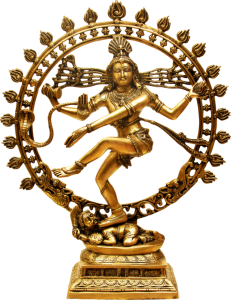úÒøÇÞø@ îøüpÑ@ ×øüpÑ@ úÒøúéøâ¡¢èÕø@ úÒøá¼ø¸Òø@ úÒøáø¨ÞøøÇøÛøÒøøùÌúÒøÐøÒøÛø+¡@¢ Çø;ÇøûÞø@ ÞøÌ} ÙøþÇø@ ÙøéøÌ} ÙøúéøðÞøÇø} ÕøùáéøÇøâÛøøÒø@ òøéøâÌø{Òøéøú²µNø@ Õøá@ ×øãöÜ G 72G
nitya* _uddha* buddha* nirvikalpa* nira<jana* nir!khy!taman!dinidhanameka* t$t”ya* yad bh#ta* bhavad bhavi`yat parivartam!na* sarvad!’navacchinna* para* brahma |
He, who is Nitya (etern al), XSuddha (pure), Buddha (All-knowing), Nirvikalpa (firm), Nira<jana (flawless), Nir!khy!ta (unexplainble), An!di-nidhana (having neither beginning nor end), Eka (unique), Tur”ya (who witnesses three states of experiences and at the same time is free from all), Bh#ta (past), Bhavat (present), Bhavi`yat (future), Parivartam!na (ever changing), Sarvad! Anavacchinna (never separated) and that is Para* Brahma (Supreme Lord).
al), XSuddha (pure), Buddha (All-knowing), Nirvikalpa (firm), Nira<jana (flawless), Nir!khy!ta (unexplainble), An!di-nidhana (having neither beginning nor end), Eka (unique), Tur”ya (who witnesses three states of experiences and at the same time is free from all), Bh#ta (past), Bhavat (present), Bhavi`yat (future), Parivartam!na (ever changing), Sarvad! Anavacchinna (never separated) and that is Para* Brahma (Supreme Lord).
ÇøòÛøøoø¸øÇøø Õøáø íøúÇøl: òéøÞø@jÞøø+úÇøáøúÇÛø¡¢ø G73G
tasm!jj!t! par! _akti/ svaya*jyotir!tmik! |
Par! XSakti (supreme power) which is self-illumined came from that supreme Lord.
!øøÇÛøÒø !øø¡¢øíø: òø@ÙøþÇø: | !øø¡¢øíøøÌ} éøøÞøü: | éøøÞøø+áúªøÓ: | !øªøÓ+áøÕø: | !øpÚß: Õø;úËøéøû G74G
!tmana !k!_a/ sa*bh#ta/ | !k!_!d v!yu/ | v!yoragni/ | agner!pa/ | adbhya/ p$thiv” |
Then the sky, air, fire, and water came in order.
%Çø+ðøø@ Õø¼ø´ÙøþÇøøÒøø@ ÕøÇøÞø: Õø¼ø´ òøÌøúíøéø+ÒÌã)Ìãúéøðmøü×øãöÜømøïø+úÇø | Çø+ðøø@ ×øãöÜúéøðmøü)Ìãøïøø+ÇÕøúÉÇøúòËøúÇøæÞø¡¢Çøøâá: | áøjøòøø+ ×øãöÜø òøøúÉÇéø¡¢ø+ úéøðmøüòÇøøÛøòøø+ )Ìã “úÇø | %Çø+ ÊøÞøø+ ªøümøÞøüÇølø: G75G
ete`!* pa<cabh#t!n!* pataya/ pa<ca sad!-_ivendra-rudra-vi`@u-brahm!@a_ceti | te`!* brahma-vi`@u-rudr!_ca utpatti-sthiti-laya-kart!ra/ | r!jaso brahm! s!ttviko vi`@ust!maso rudra iti | ete trayo gu@ayukt!/ |
There are five presiding deities of those five elements, such as Sad!_iva of the sky, “_vara of the air, Rudra of the fire, Vi`@u of the water, and Brahm! of the earth. Out of these presiding deities, Brahm! is the creator, Vi`@u the protector and nourisher, and Rudra is the cause for dissolution. Brahm! represents rajas(the cause of great activity), Vi`@u sattva(the quality of goodness), and Rudra tamas(the quality of grossness). They are related to three qualities.
×øãöÜø Ì+éøøÒøø@ ÕøãËøÛø: òø@×øÙøþéø | ÐøøÇøø ²ø òø;ñÀøe úéøðmøüïø úòËøÇøøe )Ìãïø Òøøíø+ Ùøø+ªøøÞø ²ø+ÒÌã: ÕøãËøÛøjøø: ×øÙøþéøü: | %Çø+ðøø@ ÛøÐÞø+ ×øãöÜmø: òø¡¢øíøøèæø+¡¢ø Ì+éøúÇøÞøâ®}¯ÒøáòËøøéøáøïø jøøÞøÒÇø+ | Çø+ðøø@ ÛøÒøüðÞøøÌûÒøø@ Õø¼ø´ÙøþÇøòøÛøéøøÞø: íøáûáÛø} G76G
brahm! dev!n!* prathama/ sa*babh#va | dh!t! ca s$`>au vi`@u_ca sthitau rudra_ca n!_e bhog!ya cendra/ prathamaj!/ babh#vu/ | ete`!* madhye brahma@a/ sak!_!llok! deva-tirya;-nara-sth!var!-_ca j!yante | te`!* manu`y!d”n!* pa<ca-bh#ta-samav!ya/ _ar”ram |
Among the deities, Brahm! has evolved first which creates the creation. Vi`@u causing sustence, Rudra causing dissolution and Indra responsible for enjoyment, have been evolved from the first. From Brahm! all creation comprising gods(Brahm!, Praj!patis, Indra, Pit$s, Gandharvas, Yak`as, R!k`asas and Pi_!cas), animals(cattle, wild animals, birds and reptiles), human beings and inanimate (immovable which include animates like plants and creepers and inanimate like stones etc.) have been evolved.(the set of fourteen lokas as described in different scriptures is – p!t!la, ras!tala, mah!tala, tal!tala, sutala, vitala(atala), mahitala, bh#-loka, bhuva-loka, sva-loka, maha-loka, jana-loka, tapa-loka and satya-loka). Among these, the bodies of human beings etc. are formed from the compounded five elements.
